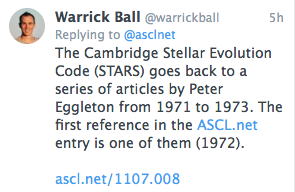Discussion last week with IAU GA attendees, including software authors and data and journal editors, resulted in a proposal to hold an unconference session on improving software citation, this intended to be a discussion that results in ideas that can be implements. The session was held on Tuesday, August 13 at 12:30 PM SAST.
This post is to capture resources that may be useful for this discussion and subsequent output. The list will grow over the next few days, so check back for additional information.
Session video
This session was recorded as part of the day’s Unconference events and can be found on YouTube.
Articles
Ten simple rules for recognizing data and software contributions in hiring, promotion, and tenure
Research Software Engineers: Career Entry Points and Training Gaps
Characterizing Role Models in Software Practitioners’ Career: An Interview Study
Research Software Science: Expanding the Impact of Research Software Engineering
